Minting NFTs: How to Win a Gas War
How to win an NFT gas war on Ethereum
How to win an NFT gas war on Ethereum
Nattynatman
Share
What is a Gas War?
Like any blockchain, there is a limit to the number of transactions per second (TPS) that can occur. This is particularly true for the Ethereum blockchain - currently processing 15-30 TPS.
To make a transaction on Ethereum or use smart contracts, one must pay gas fees - hence, minting an NFT requires ETH.
So if you think of a highly anticipated NFT project with the classic 10k supply that's minting soon, and everyone is trying to mint at the same time - mix this with the limited 15-30 TPS of the Ethereum network and there is bound to be some congestion.
Now, it’s called a gas ‘war’ because people are fighting to get their transactions processed the quickest. Think of it like a train that’s at full capacity - more people are trying to squeeze in, but they have to fight tooth and nail to budge through the crowd and get a spot.
To get their transactions processed quickest, they would usually have to pay a premium, which will be explained further below.
Why does a Gas War happen?
Gas wars were frequent occurrences during the NFT bull market in 2021. Everyone wanted to capitalize on the possibility that the NFT will be worth more than the mint price + gas fees. It became a norm to see gas spike from 30-40 gwei, to sudden hundreds or thousands of gwei.
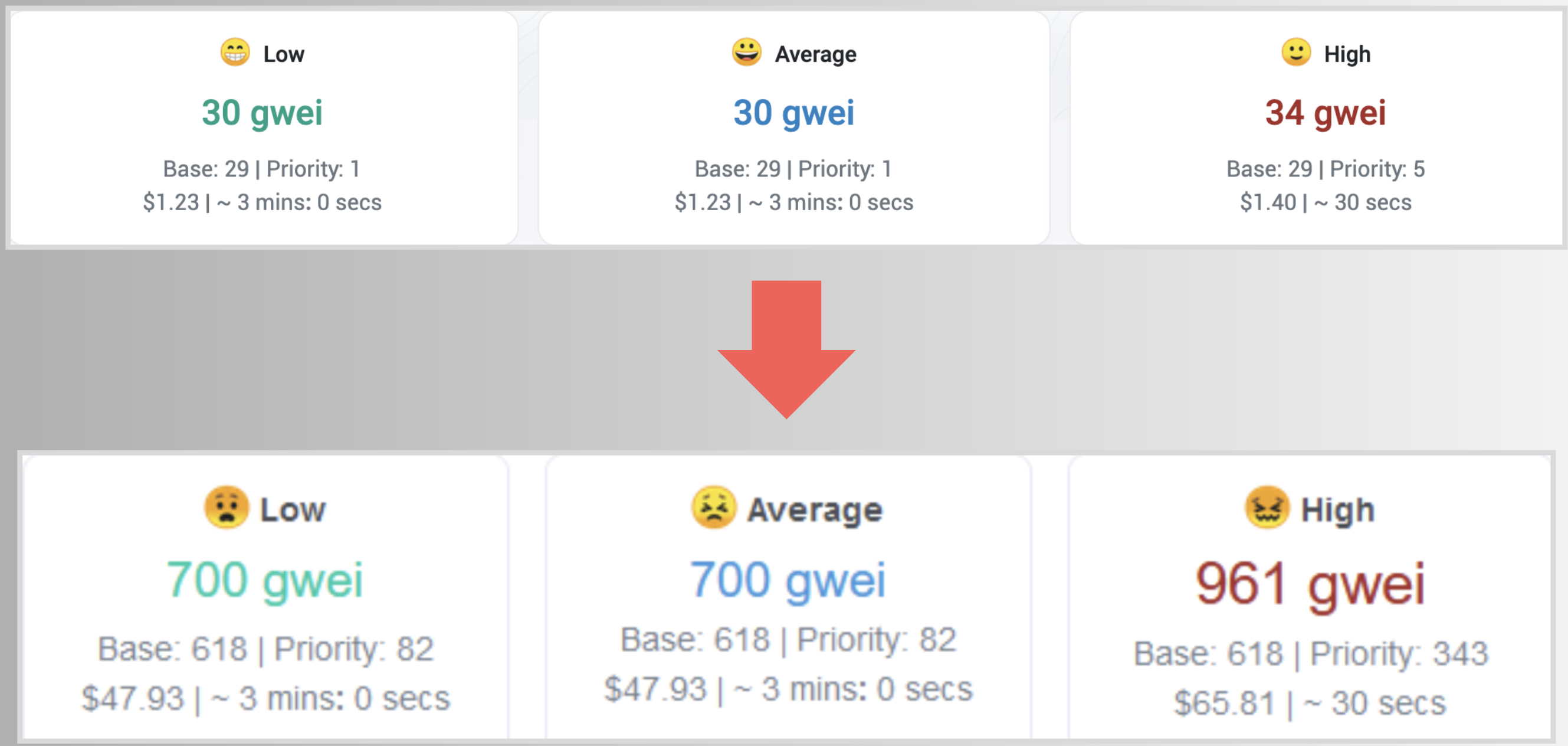
☝️ Gwei represents a fractional unit of ETH utilized within the Ethereum network for transactions involving goods and services. Specifically, one gwei is equivalent to one billionth of an ETH.
Gas wars happen when there is an extremely hyped NFT project minting, with the number of potential minters being greater than the supply. As a result, not everyone will succeed in their mint transaction.
As a hypothetical example, say if a project in the current NFT environment were to over-allocate whitelist spots to 5000 potential minters, and the project had a 2500 supply, and every one of those whitelisted people are definitely going to mint, there would most likely be a gas war as it’s essentially first come, first serve.
How to Win
For this part, we’ll be referring to actions taken within the Metamask wallet.
To win a gas war, simply put, you will be overpaying for the NFT through gas fees.
To do so, we want to front-run other transactions, and speed up our own, by customising our max base fee and priority fee.
Here’s how to do that:
Step 1: Click ‘Mint’ on the project website
Step 2: When Metamask pops up, click ‘market’
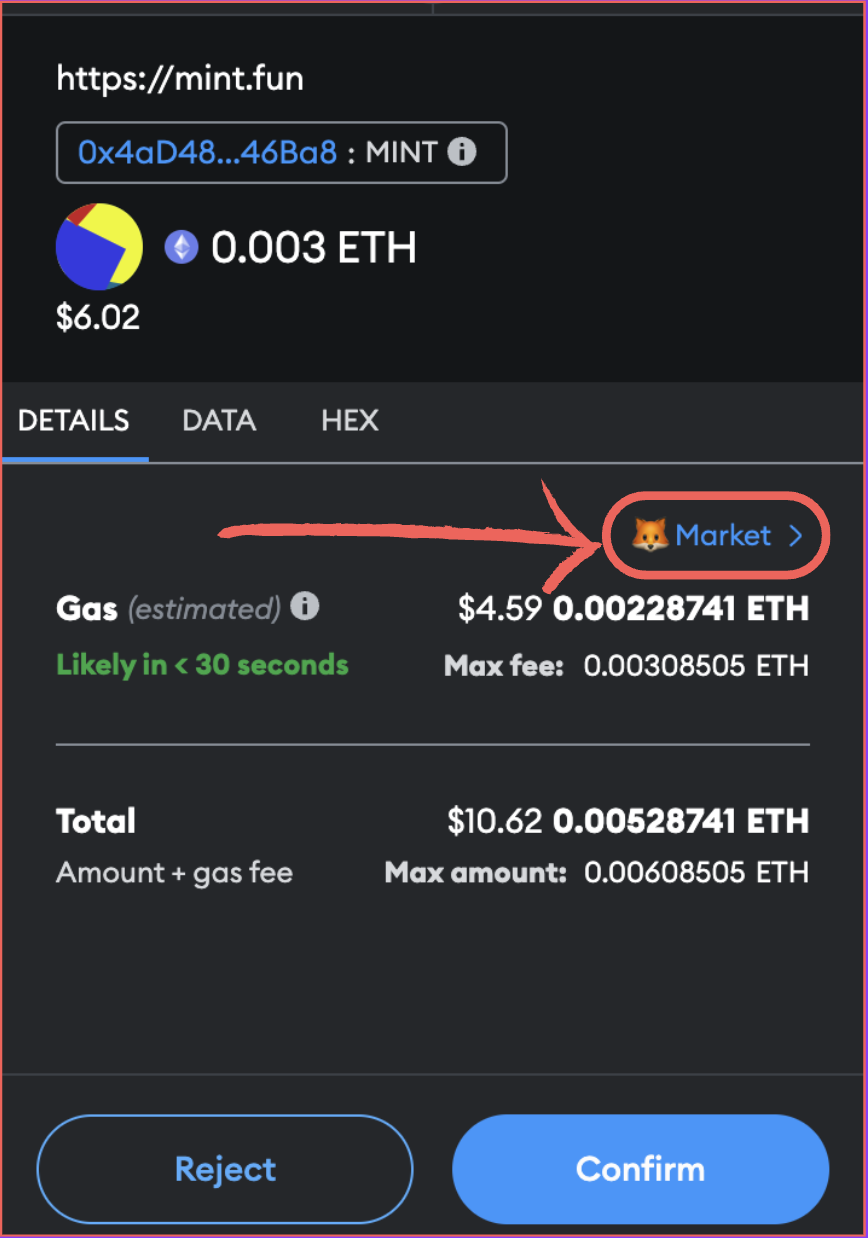
Step 3: Click ‘Advanced’
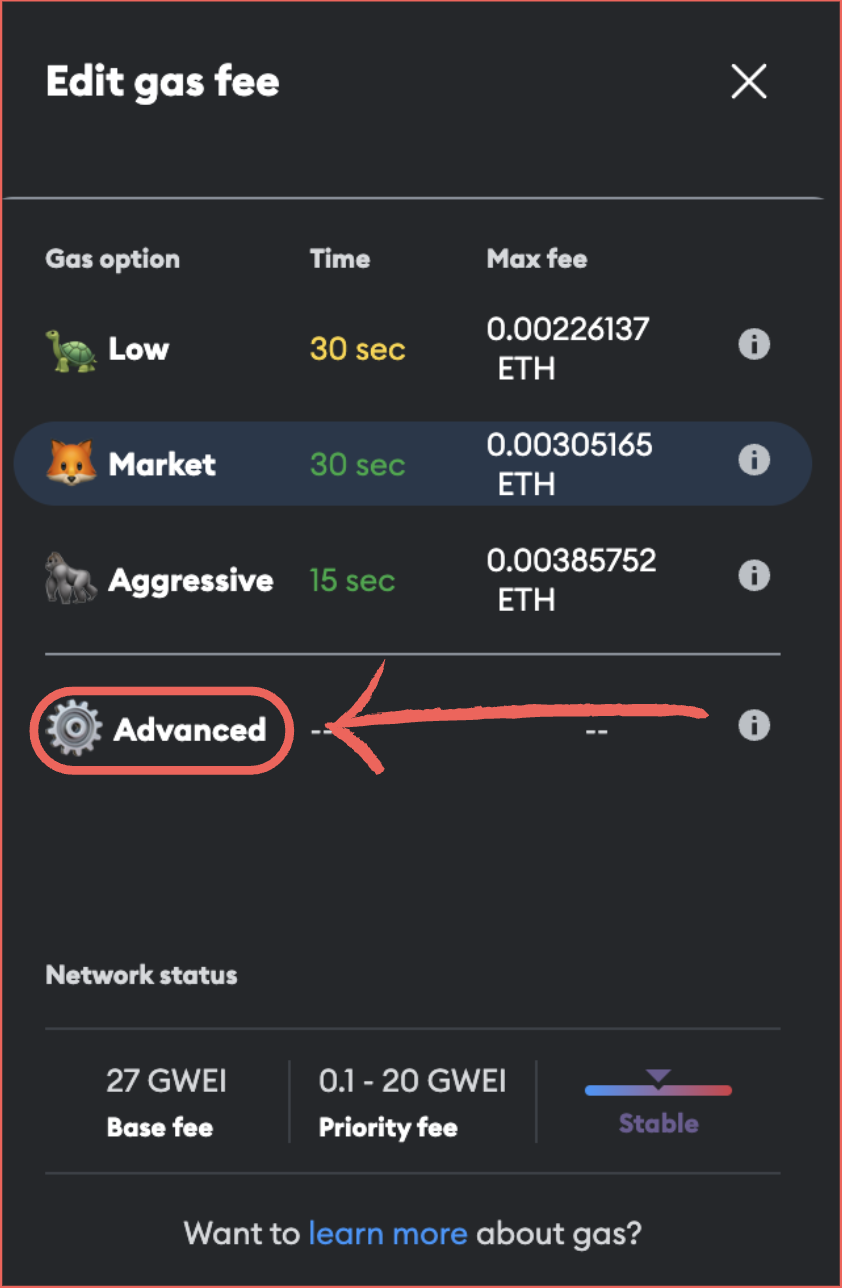
Step 4: Customise ‘max base fee’ and ‘priority fee’
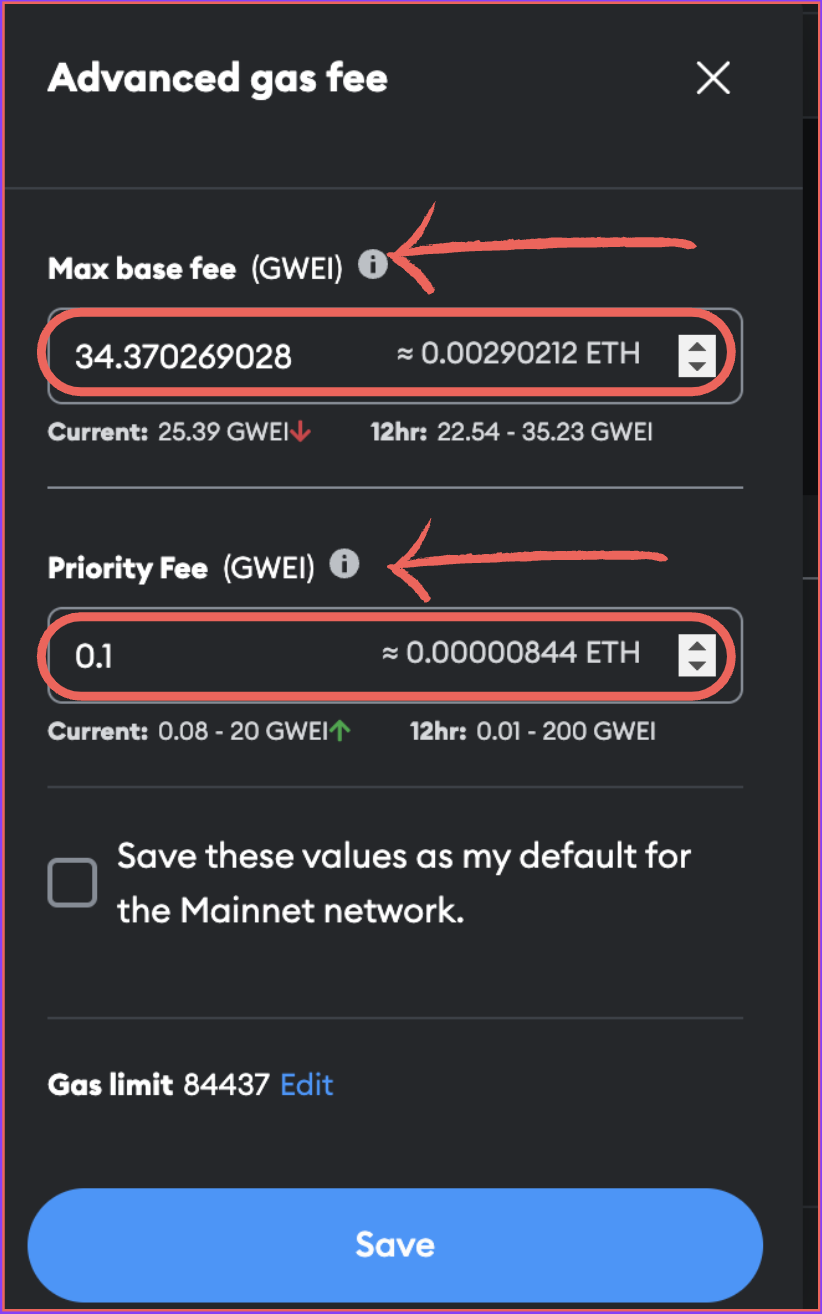
Step 5: Refer to gas estimators like https://www.blocknative.com/gas-estimator to fill in numbers for the given probability of succeeding in that transaction.
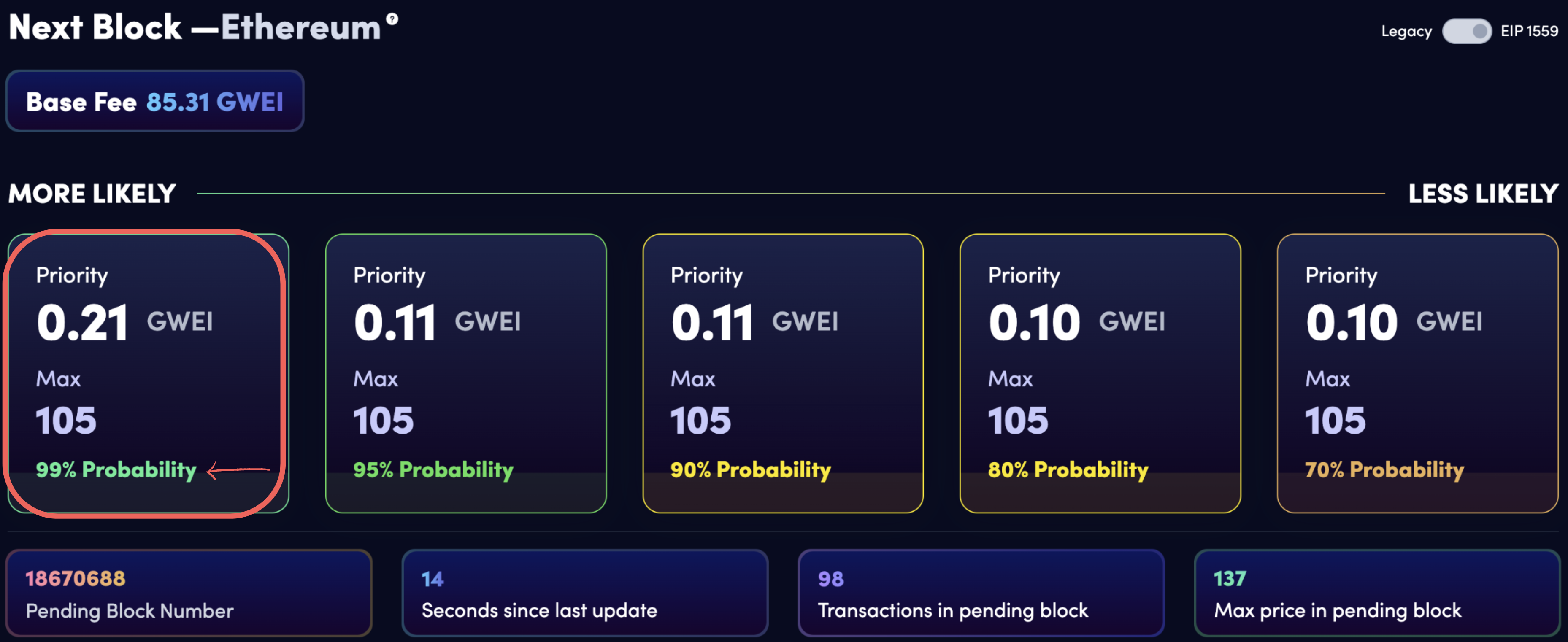
Minting directly on blockchain explorers
There could be instances when the project's website experiences a crash or fails to load due to a high volume of users jumping on at once. In such cases, you have the option to mint directly from the contract.
To do so:
- Have the contract address ready (do this beforehand by asking the team on Discord or visiting official documentation if available).
- Look up the contract address on Etherscan’s search bar.
- Scroll down a little and locate the Etherscan contract tab, then select ‘Write Contract’ and connect your wallet to the contract (need to sign another transaction on Metamask wallet).

4. Locate the "Mint/Buy" function, and insert the ‘mint price’ and the ‘mint amount’ according to the what the project states to mint. Usually you will be able to find 2 fields: “payableAmount (ether)” and “amount (unit)”. In this case, we see 'mint' as the mint price, and '_mintAmount (unit256)' as the number of NFTs you are eligible for or want to mint.

Last step: proceed with the steps above by customizing your gas fees!
How to protect yourself in a Gas War
In general, NFT minters participate in a gas war, whether intentionally or unintentionally, with the goal that the potential rewards will outweigh the risks of losing.
In any case, it’s important to know what you’re getting into, in terms of how much you’ll likely be spending in gas fees in order to secure the minted NFT, as it can tack on an extra hundred or few hundreds of dollars just to win the gas war. In this case, have a plan as to how much you’re willing to push up the ‘max base fee’ as that will be the highest amount of gas you’ll be paying based on settings.
Going in blind, and ignoring this number can cause an unpleasant surprise when you realise you’ve overpaid for an NFT that’s 2, 5, or 10x more than the original mint, all because of gas fees.
In the scenario that your transaction is still pending, yet the NFT project has already minted out - do not click ‘cancel’ on your transaction, as that in itself will overwrite it, and process the gas fees according to how clogged the Ethereum network is at the time. Instead, wait for your pending transaction to drop off on its own (or wait until gas reaches a more reasonable level if you need to make other transactions).
Will we always have Gas Wars?
The era of Gas Wars might see a shift with the continued building out of Ethereum's next phases, boasting increased scalability and potentially supporting up to 100k TPS.
Furthermore, Layer 2 scaling solutions for NFT mints and platforms like Tokentrove on Immutable embracing L2 transactions could reshape the landscape, offering smoother and more efficient experiences for users.
Conclusion
Navigating the Gas Wars when minting NFTs requires a strategic approach.
Here are the key takeaways:
- Activating Advanced Gas Controls in Metamask to customize.
- Minting directly on-chain through Blockchain explorers like Etherscan.
- Risk-management - knowing what you’re getting into.
All in all, it's crucial to stay informed about emerging strategies amidst evolving infrastructure and optimization tools.
In this competitive landscape, participants often find themselves paying significant amounts above original mint price, and success is still not guaranteed due to factors like internet latency, node issues, and wallet complications. As the gas war meta continues to evolve, speed, adaptability and self awareness will be the keys to success.
Recommended by Pluid
Tutorials
by SMooTH
Tutorials
Jul 23, 2025

Tutorials
by SMooTH
Tutorials
Aug 28, 2025

Tutorials
by SMooTH
Tutorials
Aug 2, 2025

Tutorials
by SMooTH
Tutorials
Sep 15, 2025
